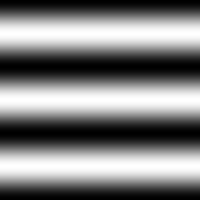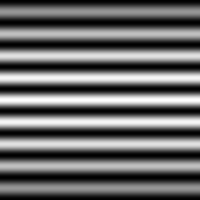Imagick::functionImage
(PECL imagick 2 >= 2.3.0, PECL imagick 3)
Imagick::functionImage — Applies a function on the image
Description
$function, array $arguments, int $channel = Imagick::CHANNEL_DEFAULT): boolApplies an arithmetic, relational, or logical expression to a pseudo image.
See also » ImageMagick v6 Examples - Image Transformations — Function, Multi-Argument Evaluate
This method is available if Imagick has been compiled against ImageMagick version 6.4.9 or newer.
Parameters
function-
Refer to this list of function constants
arguments-
Array of arguments to pass to this function.
Return Values
Returns true on success.
Errors/Exceptions
Throws ImagickException on error.
Examples
Example #1 Create a sinusoidal gradient
<?php
$imagick = new Imagick();
$imagick->newPseudoImage(200, 200, 'gradient:black-white');
$arguments = array(3, -90);
$imagick->functionImage(Imagick::FUNCTION_SINUSOID, $arguments);
header("Content-Type: image/png");
$imagick->setImageFormat("png");
echo $imagick->getImageBlob();
?>The above example will output something similar to:

Example #2 Create a gradient from the polynomial (4x^2 - 4x + 1)
<?php
$imagick = new Imagick();
$imagick->newPseudoImage(200, 200, 'gradient:black-white');
$arguments = array(4, -4, 1);
$imagick->functionImage(Imagick::FUNCTION_POLYNOMIAL, $arguments);
header("Content-Type: image/png");
$imagick->setimageformat("png");
echo $imagick->getImageBlob();
?>The above example will output something similar to:

Example #3 Create a complex gradient from the polynomial (4x^2 - 4x^2 + 1) modulated by a sinusoidal gradient
<?php
$imagick1 = new Imagick();
$imagick1->newPseudoImage(200, 200, 'gradient:black-white');
$arguments = array(9, -90);
$imagick1->functionImage(Imagick::FUNCTION_SINUSOID, $arguments);
$imagick2 = new Imagick();
$imagick2->newPseudoImage(200, 200, 'gradient:black-white');
$arguments = array(0.5, 0);
$imagick2->functionImage(Imagick::FUNCTION_SINUSOID, $arguments);
$imagick1->compositeimage($imagick2, Imagick::COMPOSITE_MULTIPLY, 0, 0);
header("Content-Type: image/png");
$imagick1->setImageFormat("png");
echo $imagick1->getImageBlob();
?>The above example will output something similar to:
